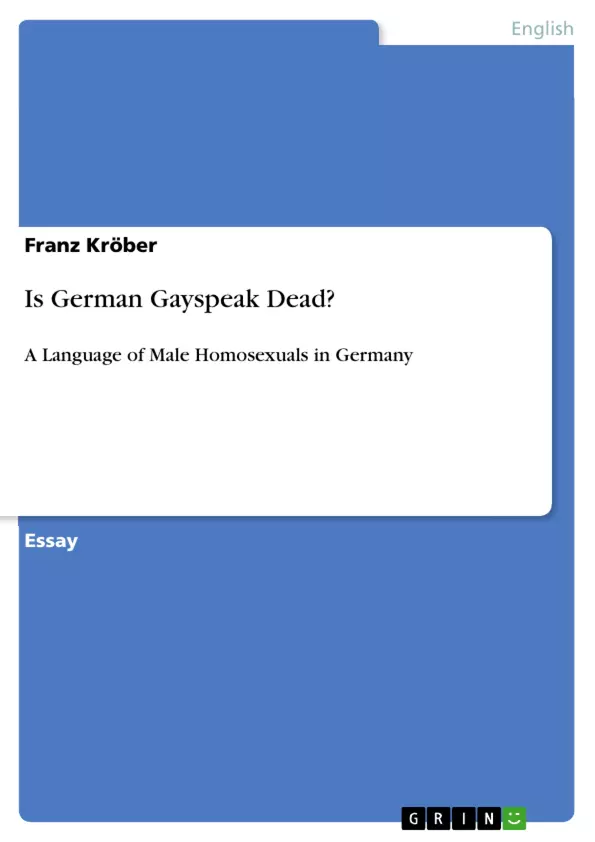In englischsprachigen Ländern ist der Gebrauch eines Codes oder einer gruppenspezifischen Sprache unter homosexuellen Männern seit den siebziger Jahren weit verbreitet. Die schwule Sprachgemeinschaft in der BRD scheint jedoch auf besondere, von der Standardsprache abweichende Zeichen zu verzichten. Bei genauerem Hinsehen wird jedoch deutlich, dass deutsche Schwule ihre sexuelle Identität zwar weniger offensichtlich, aber dennoch erkennbar auf der phonetischen und pragmatischen Ebene und mit Loanwords und Borrowings aus dem Englischen ausdrücken.
Inhaltsverzeichnis (Table of Contents)
- Introduction
- Research on Homosexuals' Language
- The Sound of Gayspeak
- Identity in Discourse
- How Gay are Words?
Zielsetzung und Themenschwerpunkte (Objectives and Key Themes)
This paper aims to investigate the language of gay men in German and explores whether their sexual identity is reflected in their speech. It examines the historical context of research on homosexual language, analyzes phonological and pragmatic features that might contribute to a gay identity, and investigates the use of vocabulary, particularly loanwords, in the context of gay discourse.
- The historical development of research on homosexual language.
- Phonological characteristics of gay language, including pitch range, breathiness, and articulation.
- Pragmatic features of gay language, such as indirectness, scaffolding, and code words.
- The role of vocabulary, particularly loanwords, in constructing a gay identity in German.
- The intersection of language and identity in the context of social change and acceptance of homosexuality.
Zusammenfassung der Kapitel (Chapter Summaries)
- Introduction: The author introduces the topic by discussing a recent opinion piece in a German newspaper regarding the rights of gay clergy. The article highlights the notion that gay men may be adopting a more conservative and inconspicuous lifestyle, potentially impacting their language use.
- Research on Homosexuals' Language: This chapter explores the history of research on homosexual language, highlighting the shift from early studies that viewed gay language as a symptom of deviance to later studies that view it as a tool for identity construction.
- The Sound of Gayspeak: This chapter examines the phonological features of gay language, specifically focusing on the "Voice" - a distinctive way of speaking characterized by specific vocal qualities. The author discusses how these features might contribute to creating a gay identity.
- Identity in Discourse: This chapter investigates the pragmatic features of gay language, including indirectness and scaffolding. It analyzes how gay speakers may use these features to convey their identity in social situations that might be challenging or sensitive.
- How Gay are Words?: This chapter focuses on the lexicon of gay German men, analyzing the use of loanwords, particularly from English, in gay magazines and discourse. The chapter discusses how these words contribute to both national and transnational identity construction.
Schlüsselwörter (Keywords)
This paper focuses on the language of gay men in German, examining key concepts such as "Gayspeak," "lavender language," phonological and pragmatic features, identity construction, loanwords, and the intersection of language and identity in the context of social change and acceptance of homosexuality. The paper explores the historical development of research on homosexual language and analyzes the use of language to both express and mask gay identity.
Frequently Asked Questions
What is "Gayspeak"?
Gayspeak refers to a specific code or group language used by gay men to express their sexual identity and build a sense of community.
Does German Gayspeak differ from English Gayspeak?
While English Gayspeak has been widely documented since the 1970s, German gay men often use less obvious linguistic markers, focusing more on phonetics, pragmatics, and English loanwords.
What are the phonological features of gay language?
Phonological features include specific vocal qualities such as pitch range, breathiness, and distinct articulation, often referred to as the "Voice."
How do gay speakers use pragmatic features in discourse?
They may use indirectness, scaffolding, or specific code words to convey identity in sensitive social situations or to mask it when necessary.
What role do loanwords play in German gay discourse?
Loanwords, particularly from English, are frequently used in gay magazines and conversations to construct both a national and a transnational gay identity.
- Citar trabajo
- Franz Kröber (Autor), 2010, Is German Gayspeak Dead?, Múnich, GRIN Verlag, https://www.grin.com/document/178099



